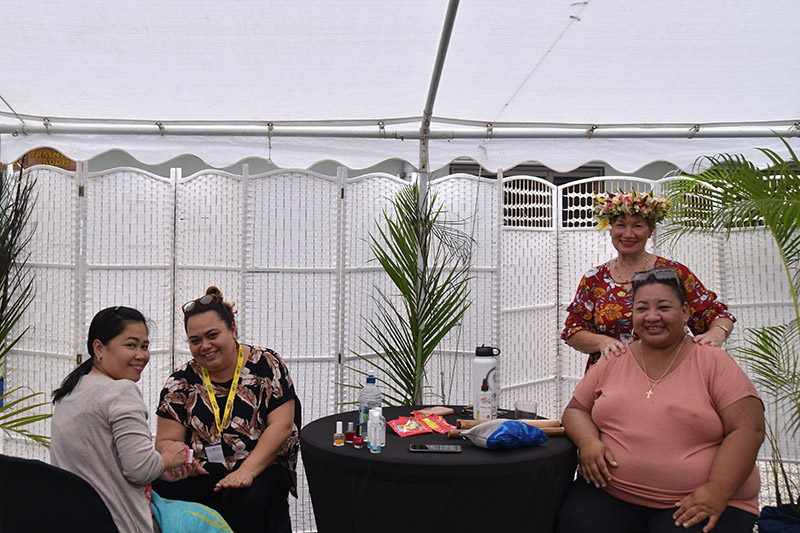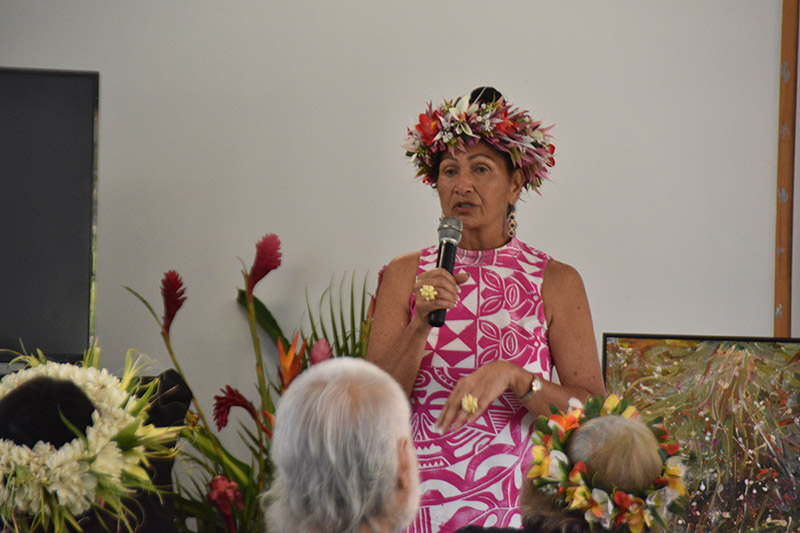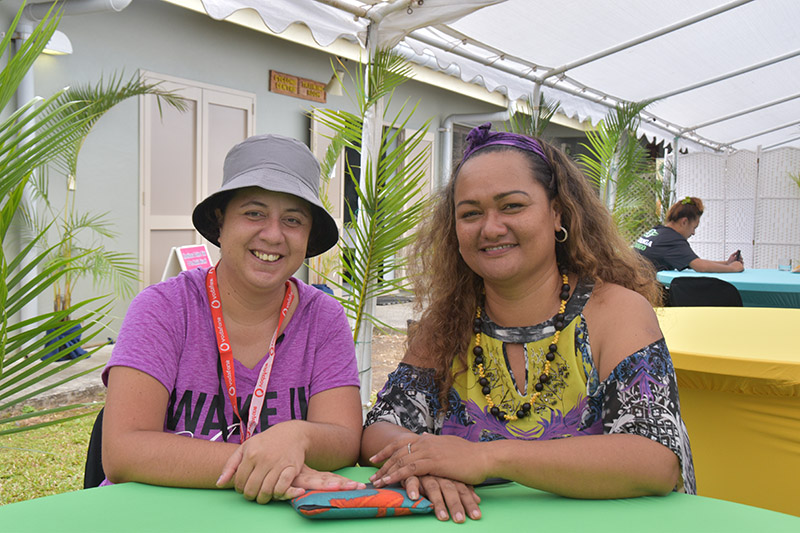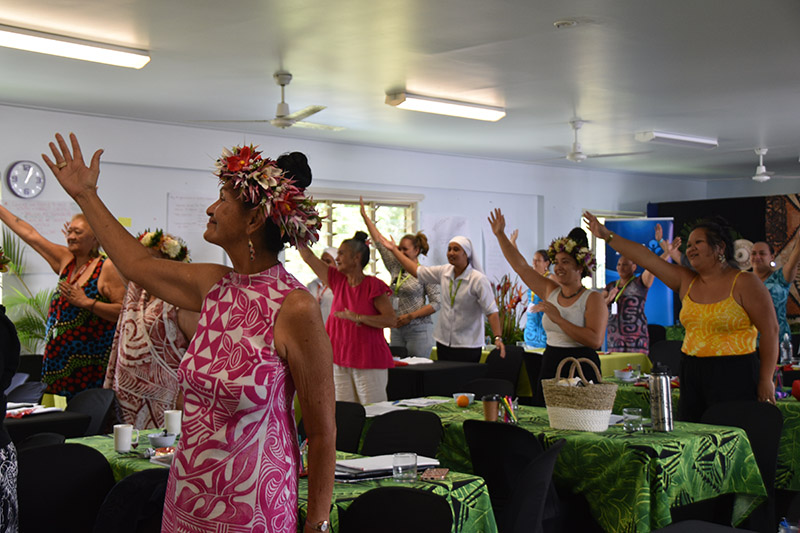Understanding the rights of persons with disabilities
Saturday 9 October 2021 | Written by Alana Musselle | Published in Local, National

The pampering corner where participants were able to give back to themselves and refresh before heading back to the main workshop room. 21100710
Yesterday marked the end of a five-day workshop dedicated to reviewing and reflecting on the United Nations’ Convention on the Rights of Persons with Disabilities in the Cook Islands. Alana Musselle attended day four of the workshop and filed this report.
The review of the Convention was to see whether it is truly being translated into daily practices in the way that people conduct themselves regarding persons with disabilities around them.
The workshop served as phase one of a four phase project between the United Nations and the Kia Orana Collective that aims to eventually result in a proposal for joint programmes over a two-year period for the Cook Islands. This will essentially be an application to a bigger pool of funds.
The workshop has been the first step of the project which is to have a consultation with multiple stakeholders including government agencies, organisations for people with disabilities as well as the private sector and the Pa Enua.
Over 80 people attended the first day on Monday, with the numbers keeping steady throughout the week.
The theme for the workshop was “We are stronger together”. Six focus areas known as pre-conditions or the “building blocks of inclusivity” were explained throughout the week. These included non-discrimination and equality, accessibility, quality service delivery, participation of persons with disability, accountability and governance, and compliant budgeting.
Claire Wilson, co-founder of Kia Orana Collective said: “A lot of things we are noticing are just people understanding where to go to get the info or support that they need. The whole thing is about giving back to one another. Obviously we are not all knowledgeable on the whole convention. We don’t know everything, but when we come together, we can fill all of those gaps together and truly become stronger together.”

Lady Tuaine Marsters who emphasized the importance of accessibility for persons with disabilities in the country. 21100708
Each session had different organisation or sector present to the crowd of eager participants wanting to educate themselves on what the Convention on the Rights of Persons with Disabilities really means to them.
Presenters with different areas of expertise including finance and budgeting and stats, education, ombudsman, and from the National Disability Council used their own skills and understanding to come up with fun and informative sessions each day.
Practical, interactive activities to get participants up and moving helped to keep things lively and allow for information to be processed easier.
A special service pampering area was also provided for participants to sit back and receive either a massage, a manicure or pedicure, or their hair done. The little breakout area from the main room allowed for people to have more intimately set conversations and to chat amongst themselves about the things they had just learnt. Once they had had their massage or got their hair or nails done, they were able to come back into the main room feeling refreshed and more confident to absorb more information.
Mii Kauvai, who served as the official masseuse, said they were providing massage all in the name of self-care and giving back.

Business partners and participants of the workshop Reina Hetland and Veronica George. 21100709
“We decided that it would be a good thing to come here and give back to everyone who works and has been part of this workshop this week. Those especially from the outer islands have reported that the workshop has been very helpful. They have learnt a lot, and it’s been nice to give them the opportunity to give back to themselves. They are ready to go back home to the outer islands after having learnt so much and also being refreshed,” Kauvai said.
Business partners Reina Hetland and Veronica George, who both have hearing impairment, stated that they found the workshop very helpful.
Hetland said it was her first time attending a workshop like this and that she had really enjoyed the experience.
The pair have a sewing business together and brought along their hand sewn purses, sheets, pareu, and bags to sell throughout the week and have been highly successful.
George said her favourite part about the workshop was being given the chance to get up on stage with Hetland and teach everybody a few phrases in sign language as well as how to spell your name.
Lady Tuaine Marsters was present and said the workshop was helpful in identifying what needed to be changed or adjusted within the Convention. “Times are changing and we must change with them,” she said.

Thursday’s session ended with a group TikTok video which the whole room learnt and filmed together before heading outside for lunch. 21100711
Destiny Tara Tolevu, executive officer for the National Disability Council, said that the workshop had been excellent in highlighting all the values that the council stands for.
“The concept of respect in this country seems to be in the understanding that it is earned. Our perspective is that respect is given understanding. We say this because if a person with disabilities has to earn respect given all the stigma that has already been attached to them by the community, we will never be able to achieve equality,” Tolevu said.
“We also believe that all human rights belong to all people with disabilities, regardless of the differences in our bodies and the way we look.”
She said that in regards to this particular workshop it had been a real eye opener not just for the disability council but for a lot of government departments to recognise what their roles and responsibilities are in regard to the Convention of the Rights of Persons with Disabilities.
“All too often it is misunderstood that it is the council’s responsibility to deliver on these things when in actuality it is the obligation of the state which is our country.”














































